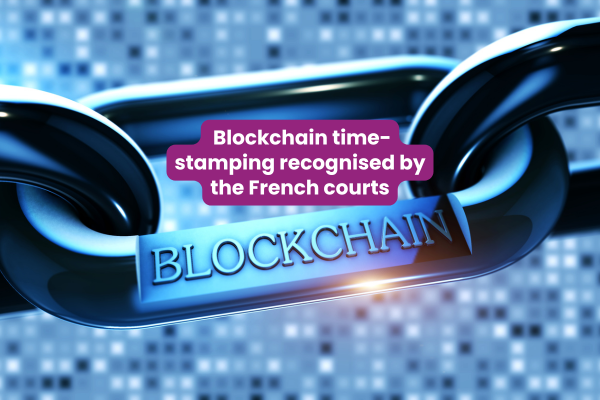Blockchain time-stamping recognised by the French courts
A turning point for digital evidence

On 25 March 2025, the Paris judicial court handed down a ground-breaking ruling on digital evidence. For the first time, a French court has recognised the probative value of a time-stamp produced via a public blockchain. This decision marks an important step in the evolution of digital justice and in the acceptance of distributed registry technologies as reliable means of proof.
A case of infringement and proof of prior art
The dispute concerned an accusation of copyright infringement on visuals. The alleged author of the works had used a time-stamping solution based on the Bitcoin blockchain to prove the anteriority of the creation. The timestamps had been generated by a specialised third party, guaranteeing the integrity and date of deposit of the files.
In its ruling, the court thus accepted the principle of proof of anteriority generated by depositing in a blockchain the digital fingerprints (or hashes) of files representing sketches and visuals of garments.
Conséquences pour les entreprises et les professionnels du numérique
Cette première décision jurisprudentielle française conforte les acteurs qui intègrent des technologies de preuve par blockchain dans leurs processus métier. Elle donne une légitimité accrue à l’horodatage distribué comme méthode de protection des actifs immatériels, des œuvres numériques ou des engagements contractuels.
Consequences for businesses and digital professionals
This first French case law decision is a boost for players who are integrating blockchain-based proof technologies into their business processes. It gives greater legitimacy to distributed time-stamping as a method of protecting intangible assets, digital works or contractual commitments.
This position paves the way for wider use of blockchain as an evidentiary tool in civil litigation, particularly in relation to intellectual property, contracts or regulatory compliance.
For businesses, this represents an opportunity to optimise the traceability and security of evidence throughout the value chain, at lower cost and without dependence on a traditional third-party certifier. However, this presupposes ensuring the quality of the solutions used, their interoperability and their legal robustness.
At Tediji, this recognition reinforces our conviction that blockchain is much more than a technological innovation; it is now an evidentiary tool that has been fully accepted by the French courts.
For a fuller analysis of this case law, we recommend reading the opinion of our expert Alain Broustail 👉